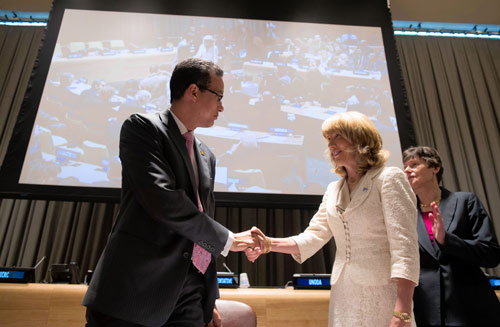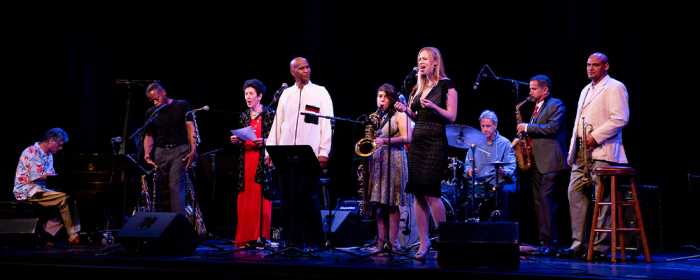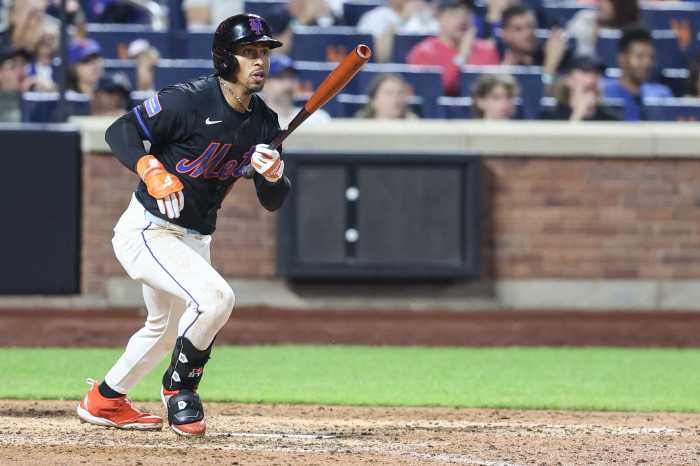Ten Caribbean Community (CARICOM) countries this week at the United Nations signed the first ever international treaty to regulate the trade of conventional weapons.
The U.N. identified them as Antigua and Barbuda, Bahamas, Belize, Grenada, Guyana, Jamaica, St. Lucia, St. Vincent and the Grenadines, Suriname, and Trinidad and Tobago.
Grenada Foreign Affairs Minister Nickolas Steele, who stopped over in New York on his way to a meeting in Guatemala said the treaty “will save many of the innocent lives which before today would have been lost as a result of the poorly regulated international arms trade.”
In addressing the ministerial segment of the special event, before participating in the historic signing of the treaty, Steele underscored the importance of the treaty for Grenada and CARICOM as a whole, adding that it “marks a point of inflection in the way conflicts are resolved and mitigated.”
His Trinidad and Tobago counterpart, Winston Dookeran, described the Treaty as “a landmark achievement for the world,” incliuding Trinidad and Tobago which suffers from illicit arms trade and cross-border organized crime, and “positively impact the Caribbean region.”
Dookeran said Port-of-Spain has already begun the process of ratification and intends to be among the first 50 States that would make the Treaty operational.
The Treaty requires a secretariat to assist in its implementation, and, to this end, Dookeran made an official bid to host that body in the twin-island republic.
The process towards an Arms Trade Treaty officially began in 2006, when the UN General Assembly adopted Resolution 61/89, “Towards an Arms Trade Treaty.”
After facing several impediments, the General Assembly, on April 2, finally adopted the Treaty with 154 member-states voting in its favor.
The Treaty, which was co-sponsored by over 100 countries, including CARICOM, comes into force 90 days after the 50th instrument of ratification is deposited.
The Arms Trade Treaty aims at preventing the flow of arms to conflict regions, as well as the flow of conventional arms to human rights abusers, terrorists, warlords, pirates and gangs.
The UN said small arms and light weapons cause the deaths of over 500,000 people annually.
As the instrument opened for signature on Jun. 3, U.N. Secretary General Ban Ki-moon said the Arms Trade Treaty “opened a door of hope” to millions of people living in deprivation and fear because of the poorly controlled trade and the proliferation of those deadly weapons.
“The world has decided to finally put an end to the free-for-all nature of international weapons transfers,” he said, adding that, “from now on, weapons and ammunition should only cross borders after the exporter confirmed that the transfer complied with internationally agreed standards.”
Ban said the Treaty would be “an effective deterrent against excessive and destabilizing arms flows, particularly in conflict-prone regions.”
“It would make it harder for weapons to be diverted into the illicit market, to reach warlords, pirates, terrorists and criminals, or to be used to commit grave human rights abuses or international humanitarian law violations,” he added.
Urging major arms-trading countries to be the first movers, the U.N. boss said “the eyes of the world are watching arms traders, manufacturers and governments as never before”. With that, he called on all governments to bring national legislation and procedures in line with the text to enable it to become a “strong force for security and development for all”.




























